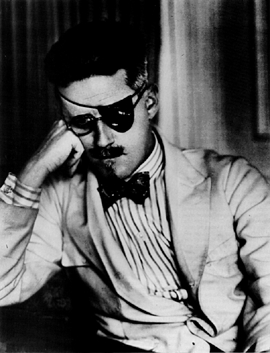
#1 Stunna James Joyce thinkin’ deep thoughts
James Joyce’s Dubliners was one of those books I read in college, shelved under “got it,” and moved on without a second thought. I just re-read (and then re-re-read) the collection again: there’s much, much more to this book than I remembered. Dubliners has always been overshadowed by Joyce’s later works, A Portrait of the Artist as a Young Man, Ulysses, and Finnegans Wake. A closer reading of these fifteen short stories–which effectively unite as a work of complex structure–reveals that many of the themes of the later masterpieces, as well as Joyce’s rhetorical technique, are prefigured in Dubliners. On the surface, the stories seem straightforward–at least in a modernist/realist sense–slice of life urban literature, stripped of romance. Indeed, Dubliners seems to take all of its characters at an ironic distance, treating the protagonists to a series of negative epiphanies. Joyce explores the literally vulgar language of commerce, rife with trite clichés and placeholders, to show how what is not said in customary discourse jars against what custom does permit. The greatest aspect of psychological realism (whatever that means) in Dubliners results from the conflation of voices at play in the stories. The characters imagine their identities in language, a language culled from equal parts Romantic poetry and Bible verses and street signs and post office directories. The intense self-consciousness revealed by the characters calls for a strange mix of empathy and loathing and ironic distancing and even embarrassment on the part of the reader. I think that this style, combined with the anti-epiphanies figured in each story, is something so thoroughly normal, even expected by the contemporary reader, that it becomes easy to overlook just how groundbreaking and prescient these stories were at the beginning of the twentieth century. If you’ve read these, take the time to re-read them. If you haven’t given Joyce a shot, this is the right place to start.
If you don’t have time to read all fifteen in the collection but still want the rhetorical gist, read: “The Sisters,” “Araby,” “An Encounter,” “Eveline,” “Two Gallants,” “A Little Cloud,” “A Painful Case,” and, of course, “The Dead.” Or, if you’re really pressed for time: “The Sisters” and “The Dead.” Have at it.

It’s Joyce’s devotion to the printed word and precision of language that have always drawn my admiration. He lived his life and art in defiance of the petty, small-minded morals of his day. JJ refused to conform or compromise, was haughty and indifferent to the opinions of critics, driven and single-minded and obsessed with trying to unlock the code of the human heart, frustrated by the limitations of language so, with FINNEGAN’S, he decided to invent his own. Good post, thanks…
LikeLike
From Dubliners, there’s an animated version of “The Boarding House” that can be viewed here:
http://www.adamsmithacademy.org/Streams/The_Boarding_House_by_James_Joyce1_stream.html
LikeLike
@dave, and there is an audio version here : http://jamesjoyceaudio.blogspot.com/ where you can listen online and dont have to download all that torrent bosh that full of adware
LikeLike
[…] Biblioklept’s lousy review (the review is lousy, not the book) of Dubliners […]
LikeLike
Ha, ha, ha, very good. You couldn’t have written a better parody if you’d tried. All you’d need is a pipe and a tweed jacket. I bet it hurt when you had academe-speak waxed and pulled off.
LikeLike
[…] Biblioklept’s lousy review (the review is lousy, not the book) of Dubliners […]
LikeLike
[…] Biblioklept’s lousy review (the review is lousy, not the book) of DublinersJoyce’s entry on the 1901 Irish Census […]
LikeLike